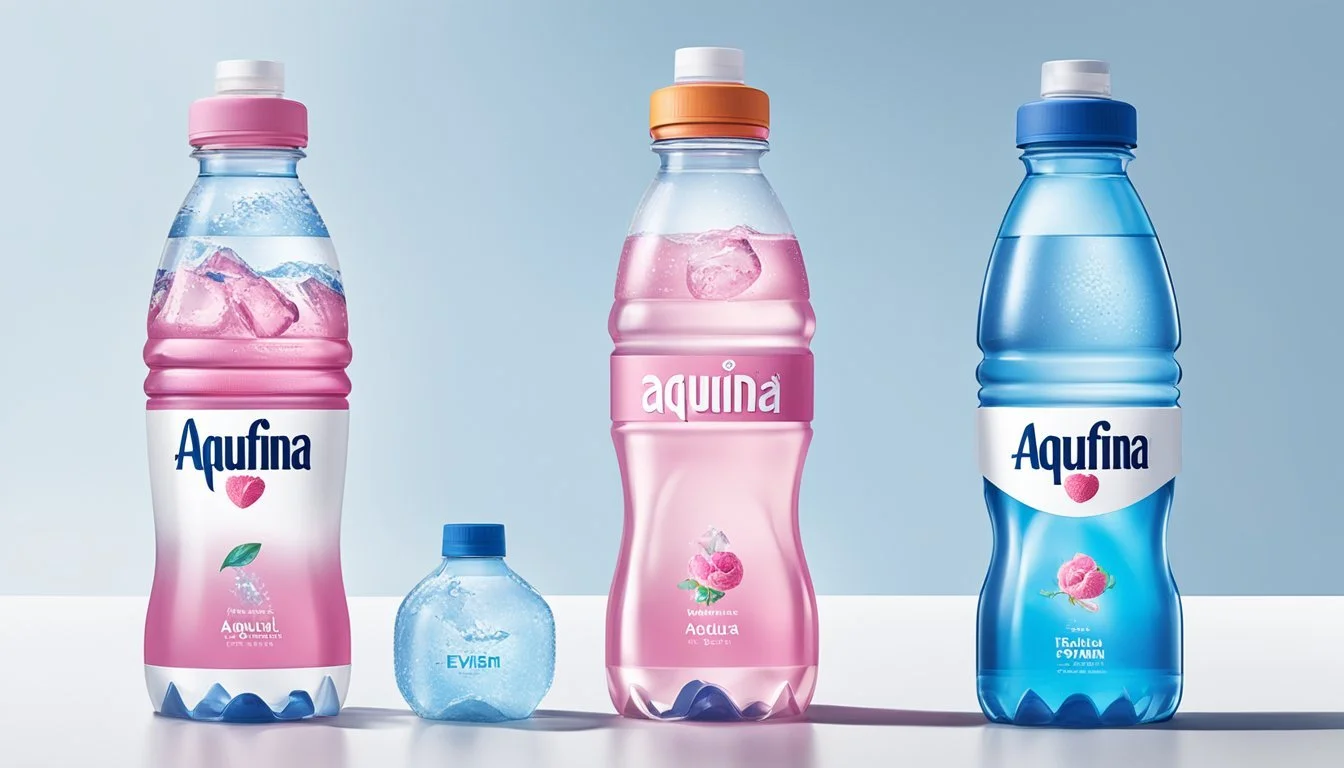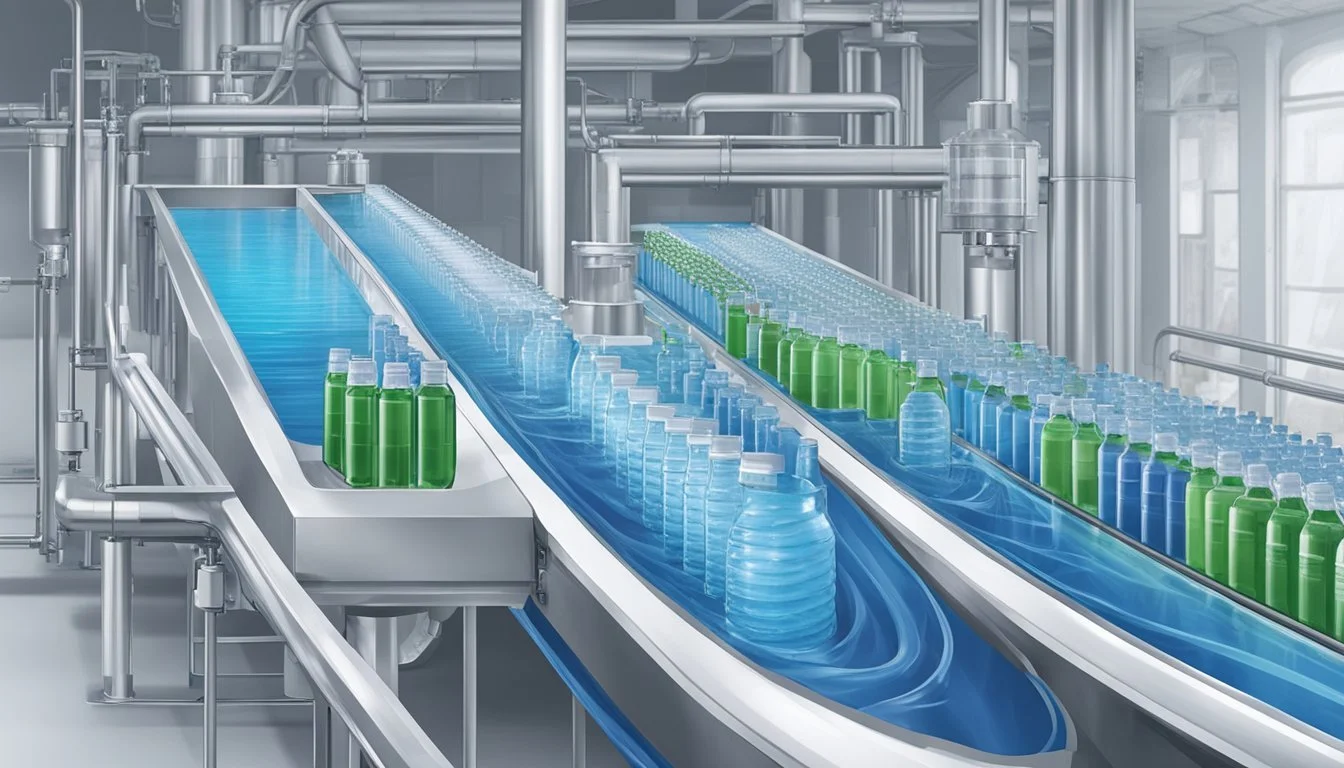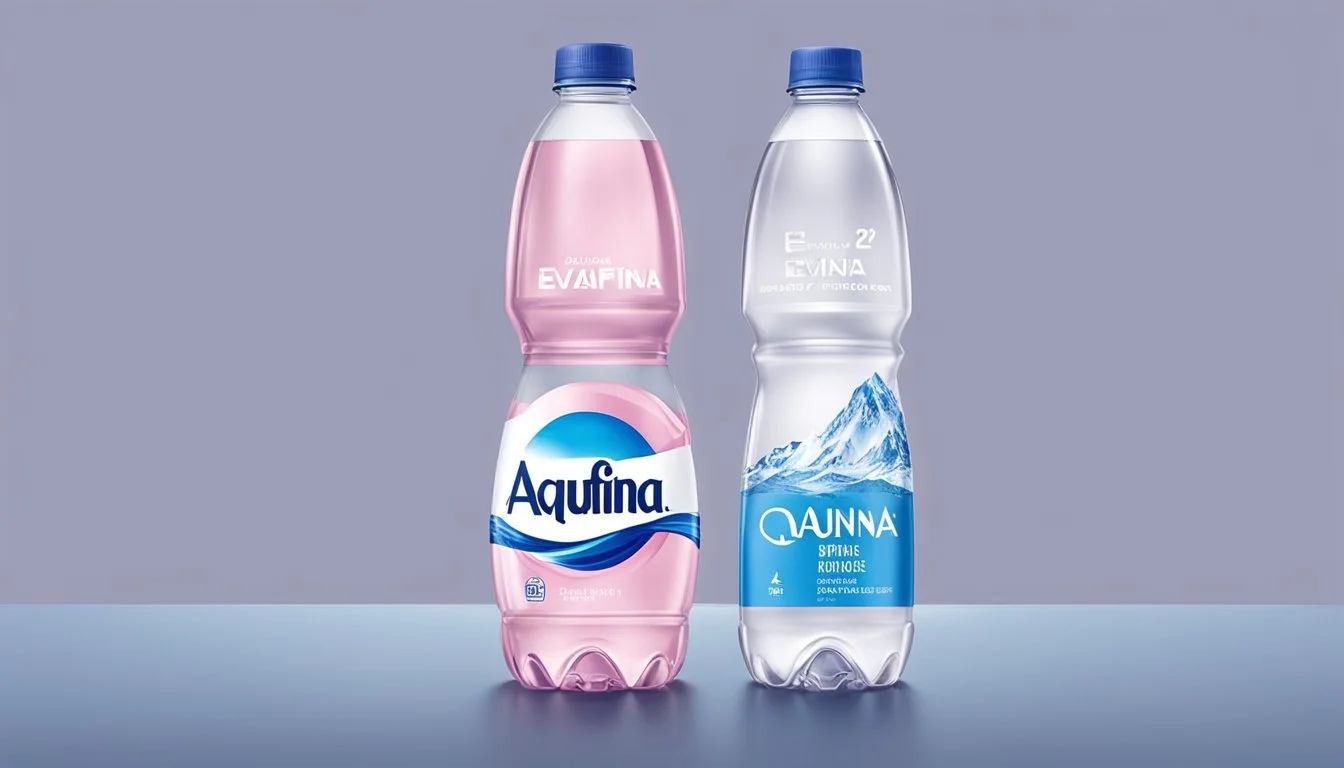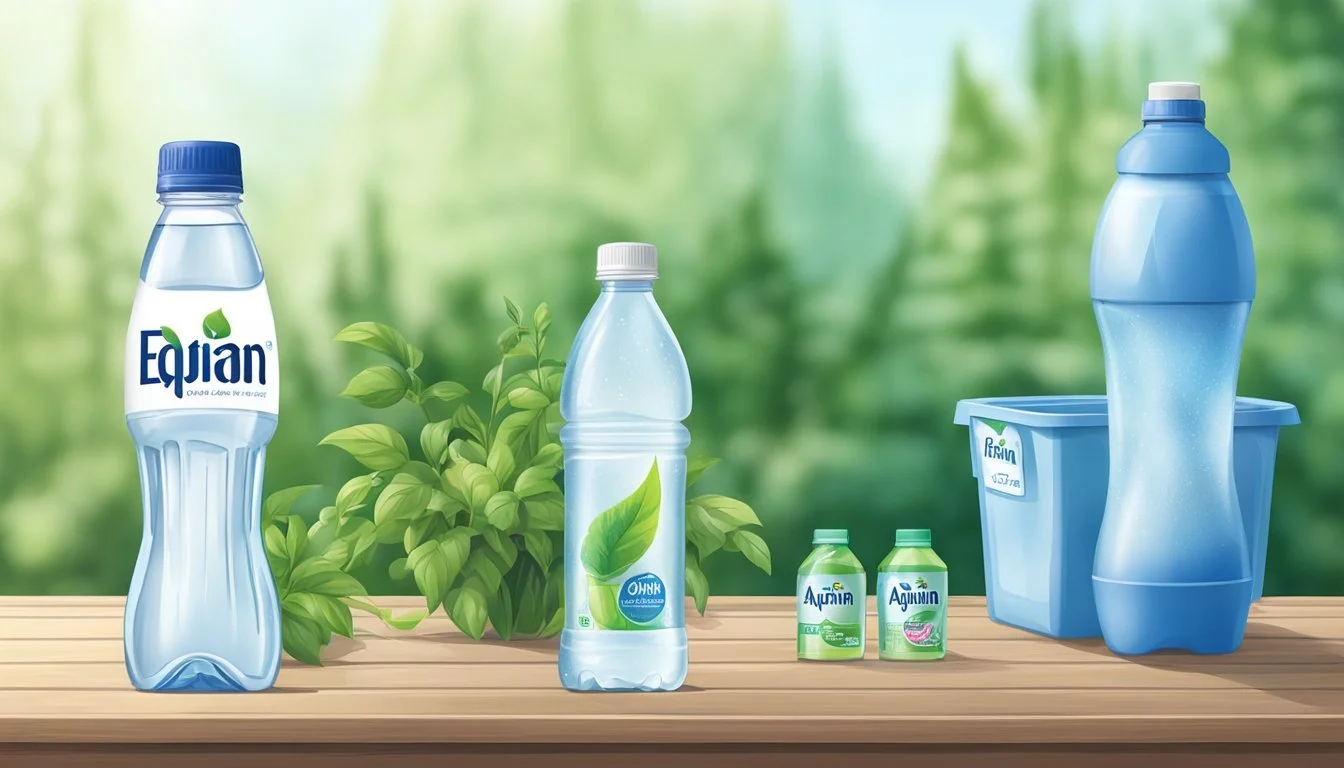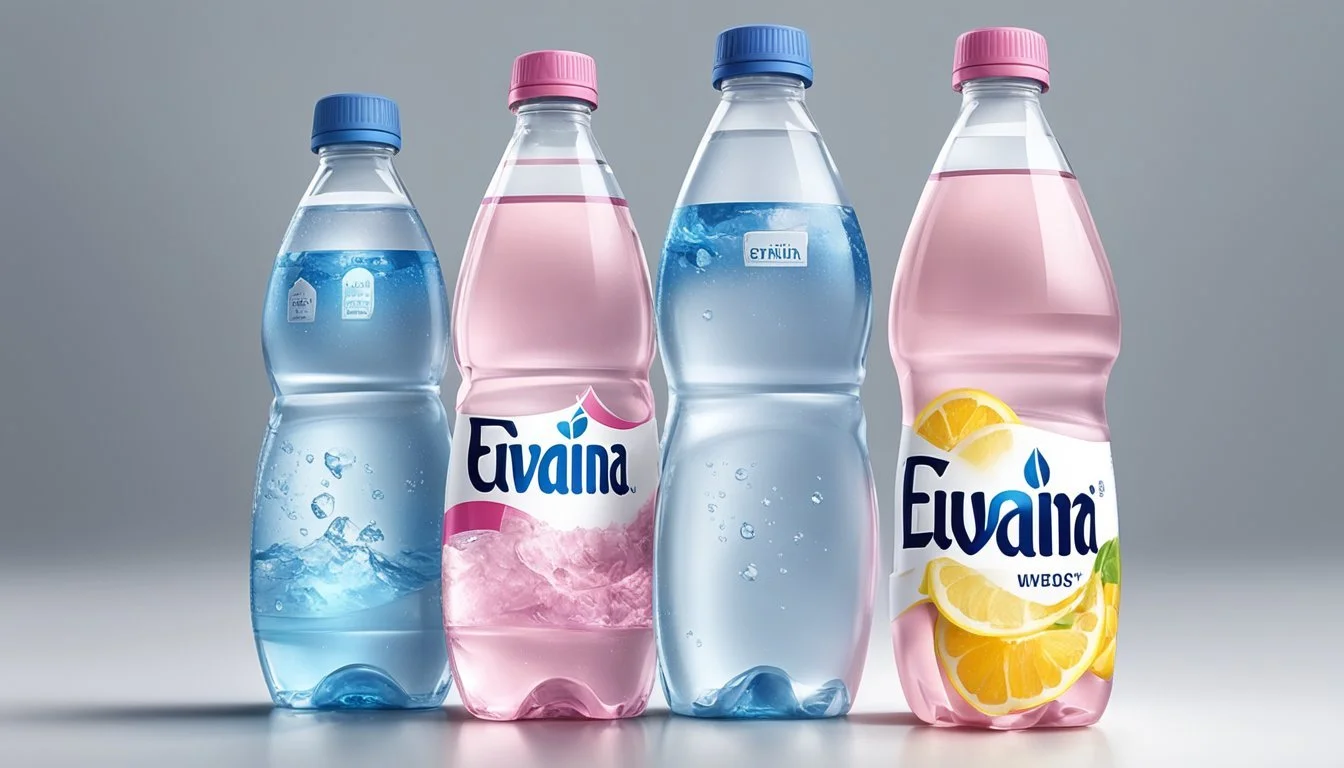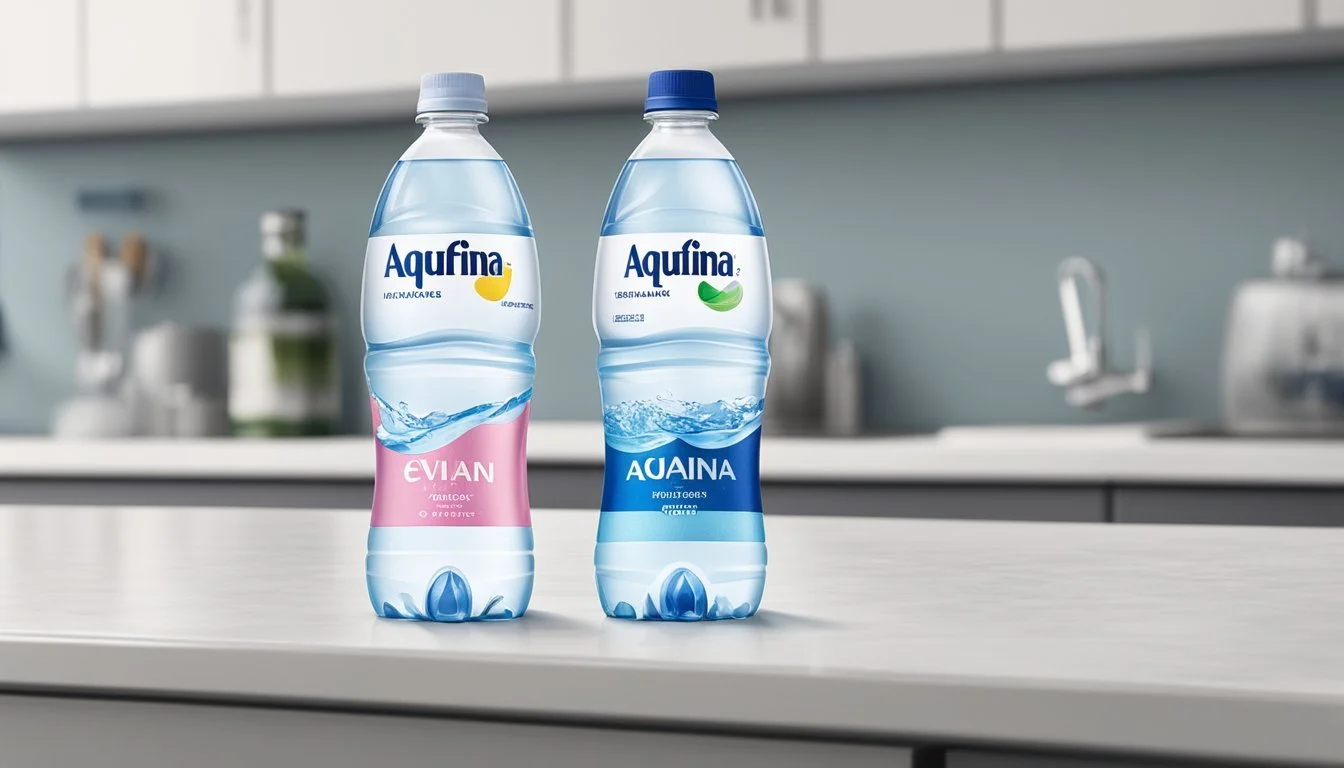Aquafina vs. Evian
A Comparative Analysis of Bottled Water Brands
The quest for hydration often boils down to personal preference, informed by factors such as taste, quality, and source. Aquafina and Evian are two prominent brands that vie for consumers' loyalty in the bottled water market. Aquafina, a product of PepsiCo, is purified drinking water that is stripped of all minerals before undergoing a thorough hydro-7 filtration process, resulting in a pure but neutral taste. On the other hand, Evian, sourced from the French Alps, is a naturally occurring mineral water that boasts a unique mineral balance and a reputation for a distinctly smooth taste.
Choosing between Aquafina and Evian is more than a matter of taste; it's understood as a reflection of the drinker's values and lifestyle. Those who prioritize purity and the taste of water that does not carry mineral undertones might lean towards Aquafina. Conversely, Evian enthusiasts appreciate the brand's commitent to natural mineral content and the flavor profile that comes from its alpine source. The comparison also extends to environmental stewardship and sustainability practices, as the production and disposal of bottled water have significant ecological implications.
In assessing which bottled water is better, it's important to consider the various factors that define ‘better’ for individual consumers. Factors include the filtration process, source sustainability, presence of minerals, and even the material of the bottle itself. Aquafina and Evian present diverging offerings that cater to different segments of the market, suggesting that the perception of superiority is highly subjective and can vary greatly among consumers.
Comparing Aquafina and Evian
When assessing bottled water brands, Aquafina and Evian are often the subjects of comparison due to their international availability and distinct branding. Aquafina is a product of PepsiCo and is known for its purification process, whereas Evian originates from the French Alps and is celebrated for its mineral content.
Aquafina sources its water from public water supplies before employing a rigorous purification system known as Hydro-7, which includes processes like reverse osmosis, charcoal filtering, and ultraviolet light exposure. This process aims to remove substances, ensuring purity and delivering a clean, crisp taste.
In contrast, Evian's water is sourced from the French Alps and comes from a natural spring. The water is naturally filtered through glacial rocks, which enriches it with electrolytes and minerals, providing a unique mineral content profile that many consumers appreciate for taste and potential health benefits.
Here are some key attributes of both brands:
Aspect Aquafina Evian Source Public Water Supply French Alps Spring Purification Hydro-7 Process Naturally Filtered through Glacial Rock Mineral Content Low Balanced; includes magnesium and calcium
Evian advocates for its water being naturally alkaline with a pH of 7.2, potentially contributing to its smooth mouthfeel. It is often marketed as a premium water brand and comes in a variety of sizes, catering to a market looking for water with natural minerals.
Aquafina, on the other hand, has a notable absence of minerals, resulting from its purification process, making it a choice for customers seeking water that is almost entirely free from minerals and other dissolved substances.
Both brands offer different experiences, and the preference between Aquafina and Evian may come down to individual taste and values, as they represent different qualities and methods in bottled water production.
Source and Production Processes
The quality of bottled water is greatly influenced by its source and the processes through which it undergoes purification or bottling. This section will articulate the distinctions between Aquafina and Evian based on their respective sources and production techniques.
Aquafina: Purification Techniques
Aquafina is a brand of purified water that originates from municipal sources. The purification process involves a rigorous filtration process that includes reverse osmosis, ozone sterilization, and ultraviolet light. This multi-barrier system effectively removes substances and ensures the production of consistent and pure water. Aquafina’s emphasis is not on naturally occurring minerals and electrolytes but the purity of the water itself after purification.
Evian: Natural Spring Origin
In contrast, Evian's water boastfully comes from the pristine Cachat Spring located in Évian-les-Bains, near Lake Geneva in the French Alps. The water filters naturally through glacial sand and volcanic rock, which naturally enriches it with electrolytes and minerals like magnesium and calcium. The authenticity of Evian lies in its natural spring water label, as it is bottled at the source without going through an artificial purification process. The unique geological origin of Evian's water is what imparts its iconic mineral composition and taste.
Taste Profile Comparison
When comparing Aquafina and Evian, two popular bottled water brands, one must consider the distinct differences in taste that stem from their mineral content and production processes.
Taste Influenced by Minerals and Production
Aquafina prides itself on a purification process that includes reverse osmosis and other filtration methods, resulting in water that is remarkably pure and free from minerals. This lack of minerals typically gives Aquafina a taste that's considered neutral and crisp, with no distinct flavors.
In contrast, Evian is naturally sourced from the French Alps and obtains a unique mineral content as it filters through glacial rocks. The presence of calcium and magnesium, along with trace amounts of other minerals, grants Evian a smooth, albeit characterful taste. Some consumers describe the taste as noticeably pleasant and refreshing because of the balanced mineral content.
Consumer Taste Preferences
Individual preferences for the taste of water can vary widely. Some consumers may prefer the:
Pure and unadorned taste of Aquafina, noting the absence of saltiness or other mineral flavorings.
Smooth and subtly nuanced taste of Evian, often attributed to its natural mineral content, which includes electrolytes that can influence the taste perception.
Taste tests and surveys often reveal a split in consumer preferences, with some favoring the purity of distilled or highly filtered waters like Aquafina, and others the natural, mineral-rich profile of Evian. Neither brand typically displays hints of chlorine, a common aversion in tap water, making them both popular choices for those seeking cleaner tasting water.
It is the combination of these individual elements—the level of mineral content and the presence or absence of certain minerals like calcium and magnesium—that shapes the taste of each brand, leading consumers to their personal preference.
Health and Safety Standards
When considering the health and safety standards of bottled water brands like Aquafina and Evian, it is important to examine the regulatory frameworks they adhere to and the quality control measures that are in place. Additionally, understanding how these waters contribute to hydration and health is essential.
Regulatory Bodies and Quality Control
Aquafina and Evian are subject to rigorous health and safety regulations enforced by government agencies such as the Environmental Protection Agency (EPA) in the United States and equivalent bodies in other countries where the products are sold. For Aquafina, being sourced from municipal water supplies, the EPA mandates specific disinfection processes to ensure the removal of contaminants before it undergoes further purification.
Evian, on the other hand, being a natural spring water, stems from the Cachat Spring located in Évian-les-Bains, France, and is monitored by French health regulations. It naturally contains minerals and is often recognized for its alkaline properties. Unlike Evian, Aquafina is known for its seven-step HydRO-7 purification system which includes:
Carbon filtration
Reverse osmosis
Ultraviolet exposure
Quality Control is paramount for both brands; for instance, Evian undergoes a series of filtration processes to ensure it meets both health standards and its own reputed taste profile.
Health Benefits of Hydration
Staying hydrated is vital for maintaining health, and the consumption of bottled water like Aquafina and Evian can contribute to this. The quality of the water, free from contaminants and adhering to safety standards, is crucial, as water is a carrier of minerals beneficial to health. Some bottled water brands like Essentia claim benefits from their higher pH levels, promoting their water as alkaline, suggesting hydration benefits that go beyond that of regular drinking water. However, these health claims are not universally accepted by the scientific community and require more research for substantive validation.
While both Aquafina and Evian provide options for safe and clean drinking water, they each offer different mineral compositions and taste due to their distinct sources and purification methods.
Environmental Impact and Sustainability
Choosing between Aquafina and Evian bottled water involves more than taste and purity; it necessitates considering their environmental footprint and sustainability measures.
Bottled Water and Environmental Concerns
Aquafina and Evian contribute to environmental concerns that revolve around the production and disposal of plastic bottles. Most plastic bottled water ends up in landfills, taking centuries to decompose. Even with recycling initiatives, a substantial amount of plastic waste does not get properly processed.
Landfill Impact: Bottles can take up to 1,000 years to biodegrade, presenting a long-term environmental threat.
Plastic Pollution: Escaping collection, plastic can end up polluting oceans and harming wildlife.
Boxed water products, an alternative packaging option, present a more biodegradable solution yet raise questions regarding resource use and carbon footprint during production and transport.
Reusable water bottles made from materials such as stainless steel or glass offer an eco-friendly alternative that can greatly reduce single-use plastic bottle waste.
Glass Bottles: A sustainable, but heavier, alternative that requires extra energy for transport.
Reusable Bottle Incentives: Initiatives that encourage the use of reusable bottles can significantly decrease the use of disposable bottles.
Efforts Towards Environmental Sustainability
Aquafina and Evian have both taken steps toward environmental sustainability. Aquafina, produced by PepsiCo, has initiated projects to reduce its carbon footprint and improve water stewardship.
Aquafina: Reduction in plastic use by light-weighting bottles and increased use of recycled PET.
Evian has made commitments to become a more sustainable brand, with specific initiatives geared towards becoming carbon-neutral and using more recycled materials.
Evian: Pledge to make all of its plastic bottles from 100% recycled plastic by 2025 and to become carbon neutral.
Both companies recognize the environmental impact of their products and are working on improving their sustainability practices. However, the effectiveness and real-world impact of these efforts require continuous scrutiny and support from environmentally conscious consumers.
Brand Reputation and Consumer Trust
When evaluating bottled water brands such as Aquafina, produced by PepsiCo, and Evian, produced by Danone, consumer trust and brand reputation play significant roles. These factors often influence purchasing decisions and are reflected in brand loyalty and consumer feedback.
Market Perception of Aquafina and Evian
Aquafina is perceived as a widely available and affordable brand, with PepsiCo's strong distribution network ensuring its presence in many markets. Although Aquafina is a popular brand, it has faced scrutiny over its source, with the brand confirming that its water comes from public water sources, which is then purified.
Evian, on the other hand, enjoys a premium market position and is often associated with luxury and purity, appreciated for its natural origin and mineral composition. Originating from the French Alps, Evian's market perception is that of a high-end product, and it carries a higher price point compared to Aquafina. It is commonly seen in upscale hotels, restaurants, and retail stores.
Certifications and Awards
Both Aquafina and Evian have been subjected to various regulations and certifications that ensure the quality of bottled water. Here's a breakdown:
Aquafina:
Certifications: Aquafina meets the stringent purification standards required by regulatory bodies, including the FDA.
Awards: Though not typically highlighted for awards, Aquafina's parent company, PepsiCo, has received recognition for its broader corporate initiatives.
Evian:
Certifications: Evian, being a natural mineral water, is subject to different quality certifications that attest to its preservation and bottling processes.
Awards: Evian has garnered various accolades, particularly in marketing and packaging innovation, emphasizing its commitment to sustainability and design.
Leveraging the reputational strength of their parent companies, both Aquafina and Evian exemplify distinct aspects of consumer trust — affordability, and accessibility for Aquafina, and natural purity with a high-end appeal for Evian.
Cost Comparison and Value
When evaluating Aquafina and Evian, a clear distinction emerges between standard and premium offerings within the bottled water marketplace. The cost comparison between these two brands reflects their positioning, with Aquafina representing a more budget-friendly choice, and Evian being associated with a higher-end segment.
Affordability vs. Premium Pricing
Aquafina is known for its affordability. It is priced competitively, which makes it a common choice for consumers looking for value. This brand's pricing strategy allows it to be widely available in grocery stores and convenience outlets, ensuring that it meets the demand for an economical hydration solution.
In contrast, Evian leans towards premium pricing. Given its reputation as a high-quality mineral water, it commands a higher price point. This expense is often justified by consumers who appreciate the brand's supposed health benefits and status symbol. Evian's presence in luxury markets and upscale venues reinforces its expensive perception.
Cost-Effectiveness and Water Consumption
The ultimate value derived from Aquafina and Evian goes beyond the shelf price, as it must be measured against consumption patterns. Aquafina consumers may enjoy a lower cost per bottle, but if they consume more due to the larger quantity available, the perceived savings diminish when comparing overall expenditure.
For Evian enthusiasts, the higher expense can lead to more conscientious consumption, potentially reducing waste. This behavior can offset the premium cost, particularly for consumers who intentionally prioritize quality over quantity. It must be noted, however, that loyal customers of Evian may still be inclined to consume it regularly despite the price, driven by their belief in the brand's intrinsic value.
Packaging and Accessibility
When assessing Aquafina and Evian, consumers not only consider the quality of water but also the packaging design and the accessibility of these brands. The following subsections delve into the specifics of their bottle design and materials, as well as their availability and convenience.
Bottle Design and Materials
Aquafina utilizes a clear plastic bottle with a blue label that is easy to recognize. Its bottles are made of PET plastic, which is highly recyclable, reflecting a commitment to environmental concerns. Specifics about the presence of BPA in their bottles are not readily available, but many beverage companies have moved towards BPA-free packaging due to health concerns.
On the other hand, Evian's bottles are often seen as more upscale, with a simplistic yet elegant design. The brand offers BPA-free bottles, a fact that is well-advertised to appeal to health-conscious consumers. Evian's packaging in glass bottles for premium lines is also a noteworthy aspect of their branding, catering to a segment looking for sustainable yet luxurious packaging.
Availability and Convenience
Both Aquafina and Evian are widely available; they can be found in a plethora of retail locations, including:
Grocery stores
Convenience stores
Specialty beverage outlets
Aquafina, being owned by PepsiCo, benefits from extensive distribution channels, assuring its presence in both traditional retailers and vending machines, highlighting its convenience factor. As a result, Aquafina is highly accessible, particularly in urban and suburban regions.
Evian, categorized as an upscale still water, is marketed for a premium experience. While it is also commonly available in grocery stores, its distribution is more selectively targeted. Evian is often found in high-end retailers, upscale dining establishments, and specialty stores. This selective placement underscores its premium branding while confirming its steady accessibility to its target market.
Water Sommeliers and Expert Opinions
Water sommeliers have gained prominence in the niche market of fine dining and upscale beverage service, bringing professionalism to water tasting and providing insights into water quality. Their expertise plays a significant role in comparing brands like Aquafina and Evian.
Professional Tasting and Analysis
A water sommelier conducts thorough taste tests and quality analyses of bottled waters. They assess various aspects such as mineral content, pH level, and mouthfeel—criteria that are central to differentiating between brands. For instance, Aquafina, known for its purity, undergoes a rigorous HydRO-7 filtration process, which may appeal for its clean taste devoid of minerals. In contrast, Evian, sourced from the French Alps, is prized for its unique mineral composition, offering a distinct taste profile valued by sommeliers.
Aquafina's Tasting Notes: Neutral taste, characterized by its lack of minerals and pure composition.
Evian's Tasting Notes: Sought after for its balanced mineral content and smooth taste.
Sommelier Endorsements and Preferences
Endorsements by water sommeliers can elevate a brand's status within the upscale bottled water market. Preferences vary as some sommeliers may favor the affordable and pure taste of Aquafina, while others might recommend the expensive and mineral-rich profile of Evian as part of a gourmet experience.
Aquafina: Often highlighted for its affordability and purity.
Evian: Typically endorsed for its premium quality and taste, aligning with upscale dining experiences.
Bottled water brands like Aquafina and Evian, each with their unique qualities, showcase the importance of specialized knowledge in distinguishing between products that might seem similar at a glance.
Consumer Preferences and Trends
Consumers exhibit distinct preferences in bottled water, favoring certain brands and types for their taste, sourcing, and brand reputation. Trends in consumption reflect a shift towards healthier, more sustainable options.
General Public Opinion
The public's opinion on bottled water varies, but a few key names consistently emerge as preferred choices. Evian is often celebrated for its association with luxury and its mineral content, emanating from the French Alps. On the other hand, Aquafina, purified through a seven-step process, tends to be appreciated for its purity and accessibility. Brands like Fiji are praised for their smooth taste and unique mineral profile, while Dasani, a Coca-Cola product, garners a mixed response due, in part, to its added minerals for taste.
Among the premium choices, Voss and Icelandic Glacial carry the allure of exotic sourcing and branding, which can sway consumer opinion. Smartwater, boasting vapor-distillation with added electrolytes, is popular among health-conscious consumers, similar to Core Hydration, which claims perfectly balanced pH. Contrastingly, regional brands like Zephyrhills and Poland Spring maintain a loyal customer base due to regional preferences.
Trends in Bottled Water Consumption
Recent trends in bottled water consumptions highlight a shift toward eco-consciousness and health. Preferences are leaning towards brands that offer both sustainable packaging and high-quality water. Boxed Water and the rise of aluminum cans showcase this trend, as consumers increasingly reject single-use plastics.
Health trends have also steered the market, leading to the popularity of LIFEWTR for its pH balance and electrolytes, and Flow, which offers naturally alkaline spring water. The trend has also seen a spike in the consumption of vapor-distilled waters, like Glacéau Smartwater, as purity becomes a significant selling point.
Specialty and artisanal waters, such as Acqua Panna and Mountain Valley, are gaining ground, signifying a consumer inclination towards waters with unique origins or mineral compositions. Yet, amidst this, leading companies like Nestle Pure Life continue to dominate due to their reputation and widespread distribution.
The industry has also observed the presence of functional waters like BluTriton, catering to niche markets with specific dietary or lifestyle needs. Collectively, these consumer preferences and trends portray a bottled water market in flux, with the desire for environmentally responsible choices and health benefits driving new consumption patterns.
Conclusion
When assessing Aquafina and Evian as contenders for the title of best bottled water, several factors come into play. Aquafina boasts a highly rigorous purification process known as HydRO-7, which includes reverse osmosis. This results in water that is free from impurities. However, some consumers may find Aquafina lacking in taste due to this purification method, which strips away minerals along with contaminants.
In contrast, Evian is sourced from the French Alps, naturally imparting minerals that contribute to its characteristic taste and mouthfeel. These minerals not only enhance flavor but also provide potential health benefits. Evian's unique mineral composition is the result of a lengthy filtration journey through glacial rocks, which makes it stand out among bottled waters.
Taste and Purity
Aquafina: Highly purified, neutral taste
Evian: Naturally mineral-rich, distinctive flavor
Source and Process
Aquafina: Tap water, subjected to HydRO-7 purification
Evian: Spring water, filtered through glacial rocks
Consumers prioritizing exceptional purity may gravitate toward Aquafina. Those who prefer naturally sourced water with beneficial minerals and a taste that reflects its origin might lean towards Evian. Therefore, the "best" bottled water between the two ultimately depends on individual preference regarding taste, source, and the level of purification desired. Each brand holds its own merits and appeals to different segments of the market.

